Listening Comprehension
ListeningComprehension1

The technological developments of the 21st century have brought about some historic advances in consumer electronics. Ten years ago might as well be a hundred years. Certainly if we look back at the way people interacted with electronics in 2000
22. A) They spent all their time looking for food.
B) Men had to go out hunting but women didn’t.
C) women stayed at home and looked after the animals.
D) They kept animals and killed them for food.
C) It was the women’s invention that changed history.
D) Women’s work was at home.
21. A) The invention of machines B) The invention of the alphabet.
C) The invention of rockets D) The invention of agriculture
最新大学英语四级听力课件Listening Comprehension课件ppt

06.06
4. W: Tom must be in a bad mood today. He hasn’t said half a dozen words all afternoon.
M: Oh, really? That’s not like the Tom we know.
Q: What does the man imply?
entering sending paper start from here writing reading ——skimming and scanning preparing listening reading in depth cloze translation
05.12.18
M: You know the electrics company is coming to our campus to recruit graduate students next weeks.
M: yes, I’d love to, but how much does the ticket cost?
2. M: Would you like to have a dinner with me this evening? There is a very good restaurant nearby.
四种逻辑关系
1、并列:and 2、转折:but 3、让步:though, although, even though,
Listening Comprehension 4

Listening Comprehension (4)Section A1.A) The doctor has stopped seeing new patientsB) The doctor’s office will be closed tomorrow.C) The doctor’s schedule is filled tomorrow.D) The doctor can see the woman tomorrow.2. A) She disagrees with the man.B) The weather doesn’t interest me.C) She likes this kind of weather.D) The weather is generally cooler than drier.3) A) The test was considerably easy.B) The test was touch.C) The first question was hard.D) All the questions in the test were easy.4) A) Secretary B) Reporter C) Teacher D) Shop assistant5) A) She likes classical musical more than modern musicB) She likes modern music more than classical music.C) She likes classical music only.D) She doesn’t like modern m usic.6) A) She has confidence in him.B) She is surprised at the news.C) She has also won a scholarship.D) she isn’t interested in the news.7. A) The woman also passed the examination. B) She didn’t expect all those surprise.C) she admired him for his cleverness, D) She was jealous of the man.8. A) On a bus b) On a plane C) On a train D) In a taxi Questions 9-12 are based on the conversation you have just heard.9. A) To see some relatives B) To buy some toysC) To sightsee. D) To go to the seashore.10. A) The car was not moving fast enough. B) Their clothing was warm enough,C) The air outside was also hot C) They were not feeling good.11. A) The weather was so hot. B) He had done enough study.C) He did not want to stay in the library any longer. D) He wanted to have fun.12. A) Waiting for Sue’s parents to arrive. B) Waiting for the car to be repaired.C) Sight-seeing in Chicago D) Visiting friends in Indiana Questions 13-15 are based on the conversation you have just heard.13. A) Harsh and long B) Gloomy C) Long but sunny D) Terrible14. A) Six B) Four C) Five D) Three15. A) Spring B) Winter C) Autumn D) Summer Section BPassage OneQuestions 16-18 are based on the passage you have just heard.16. A) Facial expression B) GestureC) Movement of the body D) Non-verbal language17. A) Because there is large number of vocabulary.B) Because the non-verbal languages are not easy to understand.C) Because the grammar is too complicatedD) Because there is no language learning environment.18. A) They will think that the child is brave.B) They will think the child is angry.C) They think that the child does not respect the older people.D) They will think that the child is uncomfortable.Passage twoQuestions 19-21 are based on the passage you have just heard.19. A) Supper. B) Lunch C) Breakfast D) Dinner20. A) Cereal B) Coffee or tea C) Sandwich D) Dessert21. A) Tasty B) Nutritious C) Not very good D) NicePassage ThreeQuestions 22-25 are based on the passage you have just heard.22. A) 11:00 a.m. B) 1:00 p.m. C) 3:00 p.m. D) 5:00 a.m.23. A) He thinks the phone call is urgent B) He will be angryC) He will be disappointed D) He will be tired.24. A) To have a talk with him. B) To discuss a problem with him.C) To inform him their decision D) To tell him a problem.25. A) He thought they were mad.B) He didn’t take it seriously.C) He called in the police to talk with the natives.D) He believed there was fight and called the police at once.Section CSome people like watching TV at home, and others may love hiking, But I like being at a bookshop. Time spent in a bookshop can be most ___26____, whether you are a book-lover or merely there to buy a book as a present. You may even have entered the shop to find ___27___ from a sudden shower. Whatever the reasons, you can soon become totally ____28____ of your surroundings.The opportunity to escape the _____29_____ of everyday life is, I think, the main ____30____ of a bookshop. Looking around, one might not be able to see many places where it is ____31___ to do this. You can wander round such a place to your heart’s _____32____ . If it is a good shop, no assistant will ____33____ you with the inevitable greeting: “Can I help you, Sir?” In a ____34___, an assistant should remain in the background until you have finished browsing. Then, and only then, are his service necessary.You have to be careful not to be attracted by the variety of books in a bookshop. It is very easy to enter the shop looking for a book on, say, ancient coins and to come out carrying a book of the latest best selling novel. This sort of thing can be very dangerous. _____35____ running up a huge amount, you can waste a great deal of time wandering from section to section.。
listening comprehension专四改革后新题型
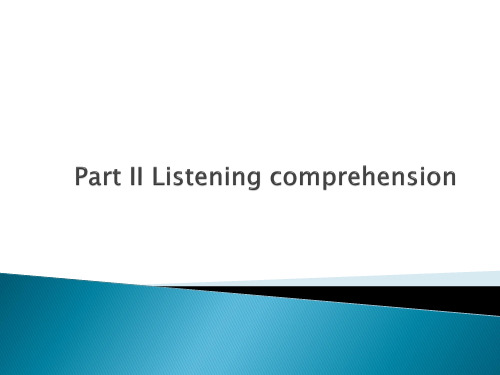
微型讲座和短文部分的内容与日常生活和学习生活 有关. 听力材料难度中等
新增题型,500单词的微型讲座+填空。要求边听 边做笔记,然后完成填空任务。 时间:10分钟 题材:与日常生活以及社会和学习活动相关 特点: 结构清晰,较为口语化。 试题部分大多为 提纲式,共有10道题,大多数可从讲座中直接得出 答案。也有部分题需要对所听内容进行理解、归纳, 然后得出答案。 难点:考查记忆、做笔记、理解、归纳等能力,增 加考试紧张度。
1. 保留前几个字母 Information: info, temporary: temp Exchange: exch instead of: I/O 2. 保留主要辅音字母 Amount: amt room rm receive rcv 3. 根据发音 Are: r ; though tho; through thru; you u
1. 选材与日常生活以及社会和学习活动相关 样题中是大学生入学须知,讲座中2016年考题为 成功的关键是什么。
小讲座是由某方面的专业人士为听众讲授日常生活、 社会或学习活动方面的相关知识,因此具有口语化 特点,句式结构和用词都比较简单。 (1)用词简单,难词有讲解 (2)用句简单明了 (3)语音语调变化
解释说明 The compulsory courses are those classes you take in your assigned groups.
If , but, however, nevertheless, instead, on the contrary, different from, unlike, because, since, the reason that, therefore, as a result, consequently...
Listening Comprehension 听力技巧 听力理解
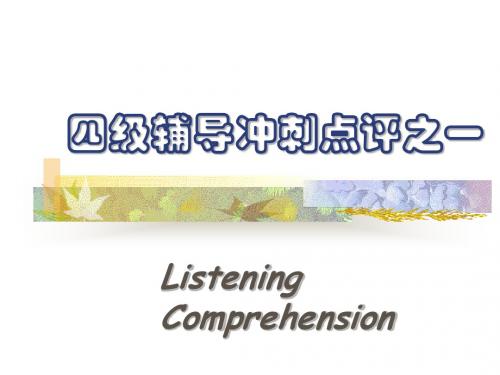
身份职业题: (1)Doctors and Patients examination, prescribe, injection, operation, be operated on, indigestion What’s the matter with you? What’s wrong (with you)? I suffered… (2)Teachers and Students textbook, course, grade, mark, exam, term paper, test, assignment, homework, lesson, class score, scholarship, pass, fail, semester, credit, oral exam, written exam, make up an exam, school record, tuition, drop out
(8) School registration, graduate, enroll, quit school, term, semester, academic year, quiz, exam, experiment, doctor’s degree, bachelor’s degree, master’s degree, tuition, scholarship, credit, campus, dormitory, clinic, canteen, gym, Students’ Union, Student’s Center, freshman, sophomore, junior, senior, undergraduate, graduate student, lecture, compulsory course, optional course, assignment, paper, seminar, subject, topic, presentation, liberal arts, science
英语听说1教材参考答案
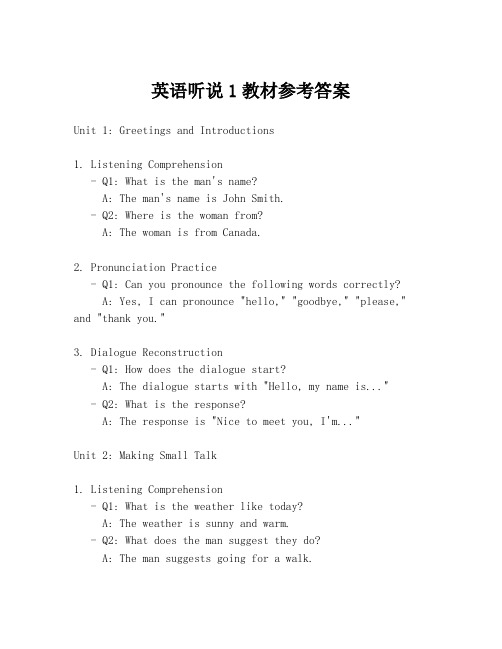
英语听说1教材参考答案Unit 1: Greetings and Introductions1. Listening Comprehension- Q1: What is the man's name?A: The man's name is John Smith.- Q2: Where is the woman from?A: The woman is from Canada.2. Pronunciation Practice- Q1: Can you pronounce the following words correctly? A: Yes, I can pronounce "hello," "goodbye," "please," and "thank you."3. Dialogue Reconstruction- Q1: How does the dialogue start?A: The dialogue starts with "Hello, my name is..."- Q2: What is the response?A: The response is "Nice to meet you, I'm..."Unit 2: Making Small Talk1. Listening Comprehension- Q1: What is the weather like today?A: The weather is sunny and warm.- Q2: What does the man suggest they do?A: The man suggests going for a walk.2. Vocabulary Building- Q1: Fill in the blanks with the correct words.A: The correct words are "weather," "sunny," "warm," "suggestion," and "walk."3. Role Play- Q1: What is the scenario?A: The scenario is two friends meeting at a park.- Q2: What are they discussing?A: They are discussing the weather and making plans for the day.Unit 3: Asking for Directions1. Listening Comprehension- Q1: Where is the man trying to go?A: The man is trying to go to the library.- Q2: What does the woman tell him to do?A: The woman tells him to turn left at the next intersection.2. Vocabulary Building- Q1: Match the following words with their meanings.A: The words are "directions," "intersection," "left," "right," and "library."3. Dialogue Reconstruction- Q1: What is the first question the man asks?A: The first question is "Excuse me, could you tell me how to get to the library?"- Q2: What is the woman's response?A: The woman's response is "Sure, just go straight and turn left at the next intersection."Unit 4: Making Arrangements1. Listening Comprehension- Q1: What time is the meeting scheduled for?A: The meeting is scheduled for 3 PM.- Q2: What does the man need to bring?A: The man needs to bring his laptop and a notebook.2. Vocabulary Building- Q1: Fill in the blanks with the correct words.A: The correct words are "meeting," "scheduled," "laptop," "notebook," and "bring."3. Dialogue Reconstruction- Q1: What is the purpose of the meeting?A: The purpose of the meeting is to discuss the project plan.- Q2: What does the woman remind the man?A: The woman reminds the man to bring his laptop and notebook.Unit 5: Describing Daily Routines1. Listening Comprehension- Q1: What time does the woman usually wake up?A: The woman usually wakes up at 7 AM.- Q2: What does the man do after work?A: The man goes to the gym after work.2. Vocabulary Building- Q1: Complete the sentences with the correct words.A: The correct words are "wake up," "routine," "work," "gym," and "evening."3. Dialogue Reconstruction- Q1: What does the woman do in the morning?A: The woman has breakfast and goes to work in the morning.- Q2: What is the man's evening routine?A: The man's evening routine includes going to the gym and reading.Unit 6: Discussing Hobbies and Interests1. Listening Comprehension- Q1: What is the woman's hobby?A: The woman's hobby is painting.- Q2: What does the man like to do in his free time?A: The man likes to play the guitar in his free time.2. Vocabulary Building- Q1: Match the following words with their meanings.A: The words are "hobby," "painting," "guitar," "free time," and "interest。
英语听力名词解释(二)
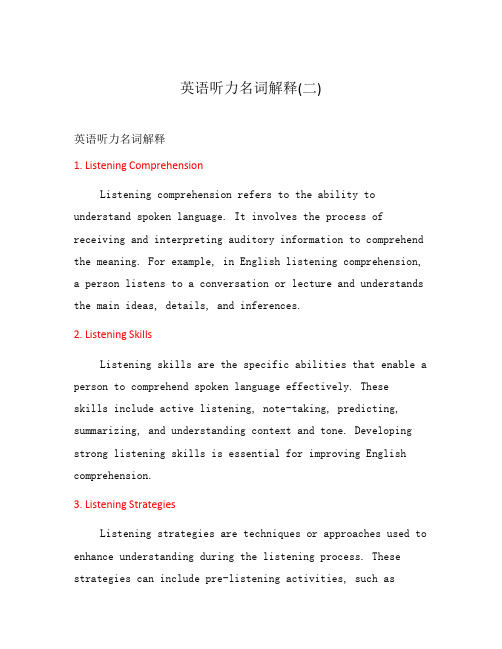
英语听力名词解释(二)英语听力名词解释1. Listening ComprehensionListening comprehension refers to the ability to understand spoken language. It involves the process of receiving and interpreting auditory information to comprehend the meaning. For example, in English listening comprehension, a person listens to a conversation or lecture and understands the main ideas, details, and inferences.2. Listening SkillsListening skills are the specific abilities that enable a person to comprehend spoken language effectively. Theseskills include active listening, note-taking, predicting, summarizing, and understanding context and tone. Developing strong listening skills is essential for improving English comprehension.3. Listening StrategiesListening strategies are techniques or approaches used to enhance understanding during the listening process. These strategies can include pre-listening activities, such aspredicting or brainstorming relevant vocabulary, as well as during-listening activities, such as identifying keywords, taking notes, and paraphrasing information.4. Listening Comprehension ExercisesListening comprehension exercises are activities designed to practice and improve listening skills. These exercises can involve listening to dialogues, interviews, presentations, or audio recordings and answering questions based on the content. They help develop vocabulary, grammar, and overall comprehension abilities.5. Authentic Listening MaterialsAuthentic listening materials refer to real-life audio resources, such as recordings of native speakers, podcasts, songs, or news broadcasts. These materials provide learners with exposure to natural language, accents, and cultural aspects, helping them develop more authentic listening skills.6. Multiple Choice QuestionsMultiple-choice questions are a type of task in which learners must choose one correct option from several provided choices. These questions are commonly used in listening comprehension assessments to evaluate understanding of mainideas, specific information, or logical relationships withina conversation or lecture.7. Listening SpeedListening speed refers to the rate at which spoken language is delivered and heard. It can vary depending on the speaker, context, and language proficiency of the listener. Practicing listening at different speeds can improve comprehension and adaptability in real-life listening situations.8. Context CluesContext clues are hints or information in the surrounding words or sentences that help listeners infer the meaning of unfamiliar words or phrases. Paying attention to contextclues can assist in understanding content and reduce the dependency on dictionary definitions.9. Leveled ListeningLeveled listening refers to graded listening materials that are designed according to learners’ proficiency levels. These materials gradually increase in difficulty, providing learners with appropriate challenges as they progress. Leveled listening helps learners build confidence and understanding at their own pace.10. Listening FatigueListening fatigue occurs when a person becomes mentally or physically exhausted from prolonged or intensive listening activities. It can lead to decreased concentration, comprehension, and overall performance. Taking breaks and practicing active listening techniques can help reduce listening fatigue.Remember, consistent practice and exposure to various listening materials are crucial for improving English listening comprehension skills.。
TEM4--Listening Comprehension
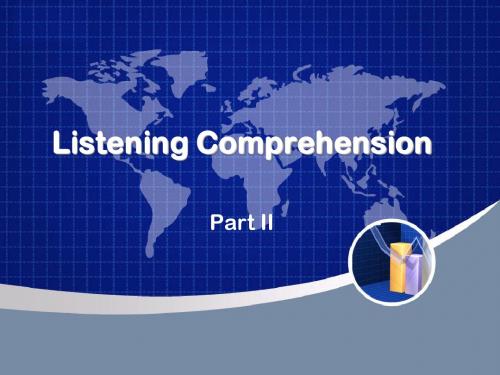
Part II
目的
检测考生在类似日常生活中的情景中获取口 头信息的能力。
考试时间:约20分钟; 共计30题;共15分
具体要求
1。日常生活和社会生活的谈话 2。理解大意,领会说话者的态度 3。能听懂正常速度的BBC/VOA的主要内容 4。能辨别各种英语变体
7。体会语言的交际功能。 8。 提高短时记忆能力。 9。 注重新闻听力。
如何应对长对话?
1。考查对话的诸要素 2。考查基本事实 3。 考查概括和推理能力
如何应对短文?
• 1。 短文题材 • 2。短文的考查要点
如何应对新闻?
1。新闻报道的一般特点 2。新闻英语的应试技巧
题型:客观题 共三节,每节有10道小题 Section A: Conversations Section B: Passages Section C: News Broadcast
Байду номын сангаас题原则
1。 语法不超出考试大纲规定 2。词语原则上不超出考试大纲规定
如何备考
1。 要克服心理障碍。 2。 多练习获取口头信息的能力。 3。 精听与泛听结合。 4。 学会预测信息。 5。 学会做要点选择。 6。 培养用英语思维的能力。
- 1、下载文档前请自行甄别文档内容的完整性,平台不提供额外的编辑、内容补充、找答案等附加服务。
- 2、"仅部分预览"的文档,不可在线预览部分如存在完整性等问题,可反馈申请退款(可完整预览的文档不适用该条件!)。
- 3、如文档侵犯您的权益,请联系客服反馈,我们会尽快为您处理(人工客服工作时间:9:00-18:30)。
二、转折陷阱题
要特别注意but后面的内容,因为but前往往是婉转 的客套话,而后面的才是真正的心里话。 常见的表达方式为: I'd like...,but... I was planning to...,but... I'm sorry to hear that, but... That's great,but...
逻辑推断类—技巧点拨
逻辑推断类题目主要考查根据整体内容,概括 总结主旨和大意;推测时间、地点、身份、人 物关系等;推测说话人的意图、观点和态度;
(1)根据说话者的语气、语调,推断弦外之音。 如:降调表示赞同、肯定;声调表示疑问、否定。 朋友之间语气较友好;夫妻之间语气较甜蜜;同 事之间语气较客气。 (2)注意一些语法结构的运用。如;虚拟语气表示 与事实相反;否定加比较结构表示最高级。 (3)归纳时要把双方谈话的内容联系起来考虑, 注意对话的完整性,防止以偏概全。
2.Where does the conversation probably take place?(2016.新课标I. 4) A. In a wine shop. B. In a supermarket. C. In a restaurant.
听力原文
Text 4
M: Here’s the menu, Madame. Would you like something to drink? W: Yes, please. May I see the wine list? M: Certainly. Here you are.
3.What is the probable relationship between the speakers?(2016.新课标I. 8) A. Schoolmates. B. Colleagues. C. Roommates.
听力原文
Text 7
M: Hi, Sue. How’s it going? W: Oh, hi, Frank, just fine. How are your classes? M: Pretty good. I’m glad this is my last term here, though. W: Why is that? I thought you were enjoying school. M: I was. But now I’m getting tired of it. I’m ready for the real world. W: What are you planning to do when you graduate?
事实细节类—技巧点拨
事实细节类题目主要考查准确理解具体细节,还 要求学生对所听到的信息进行简单的处理的能力。
一、数据信息题
(1)掌握时间的表达法,快速做出反应,如: half past six, a quarter to two, nine twenty等; (2)辨别同音或近音,如:-teen结尾的与-ty结 尾的数词的读音和意义的辨别。 (3)熟悉年代表达,如:in 1980;in the 1980s(20世纪80年代)
3. Where did Michael go last year? (2015.新课标I. 7) A. Russia. B. Norway. C. India.
听力原文
Text 6
W: Hi, Michael! I heard you just came back from a holiday? M: Yes. I stayed for a week in China and 5 days in India. W: You do travel a lot, don’t you? Last year, you went to Norway, right? M: Well, I’ve been to quite some countries, but not yet to Norway. Last summer, I toured Russia for two weeks.
例题 What is the probable relationship between the speakers?(2014.新课标I. 12) A. Driver and passenger. B. Husband and wife. C. Fellow workers.
M: Hey, Lucy. Do you have some time to talk about next week’s trip with me? W: Sure, Dave. M: OK. So, we’re leaving on Monday from Hartsfield International Airport, and returning on Friday. Do we take ourselves to the airport? Maybe we need to book a taxi, or just go by bus. W: No, we don’t have to. The company car will pick us up and take us there. M: Oh, that’s good. When?
例题 What does the man think of the book? (2014年.新课标I.4) A. Quite difficult. B. Very interesting. C. Too simple. W: I hope you like the book I lent you. I wasn’t sure if you’d be interested. M: I had the same doubt at first. But once I started, I simply couldn’t put it down.
M: First, I want to get a job as a computer programmer, and then after five years or so, I’d like to start my own business. W: Sounds good. I still have three terms to go until I’m done. M: You’ll make it for sure. Well, see you later. W: Bye!
(4)快速记录多个数字,根据问题计算结果。 计算题中常见的表达法: half,double,twice,one third,at a 30% discount(打 七折),one third off the normal price(打七折), more than,less than...
例题 1.What time is it now?(2015年.新课标I.1) A. 9:10 B. 9:50 C. 10:00 W: What time is your train leaving? M: It leaves at 10. I’ve got 50 minutes left. W: You’d better hurry, or you won’t be able to catch it.
Part 1 事实细节题
1.How will Susan spend most of her time in France?(2017.新课标I. 2) A. Traveling around B.Studying at a school C.Looking after her aunt
听力原文
Part 3 主旨大意题
1.What are the speakers talking about? (2017.新课标I. 3) A. Going out B.Ordering drinks C.Preparing for a party
听力原文
Text 3
M: Let’s see what drinks you’ve got for the party tonight. W: Everything! Beer, wine, soft drinks like Coke, 7-Up…you name it, I’ve got it! Have you ordered the cake? M: Of course.
Part 2 简单推断题
1.What is the man going to do ? (2017.新课标I. 2) A.Go on the Internet B.Make a phone call C.Take a train trip
听力原文
Text 5
W: I wish I knew the times of the trains to London. But our phone’s out of order. M: Don’t worry, Grandma. I’ll find out for you on the Internet. W: Thank you!
Text 2
M: Susan, I heard you are going to France. How long will you be staying there? W: A whole year. My aunt lives there. I’m going to do a one-month course at a language school and spend the rest of the time traveling.
2.What does the woman suggest the man do? (2016.新课标I. 3) A. Tell Kate to stop. B. Call Kate’s friends. C. Stay away from Kate
听力原文
Text 3
